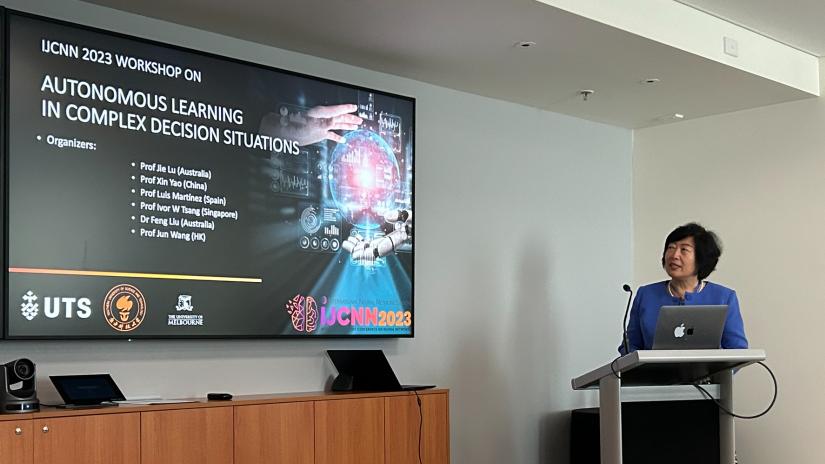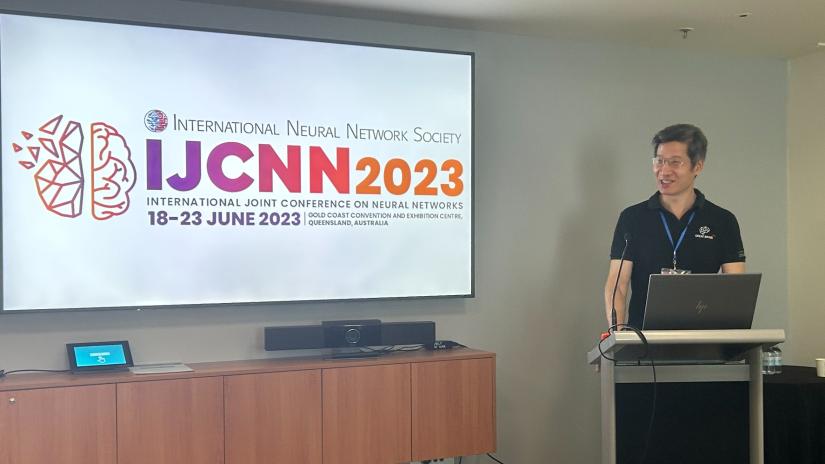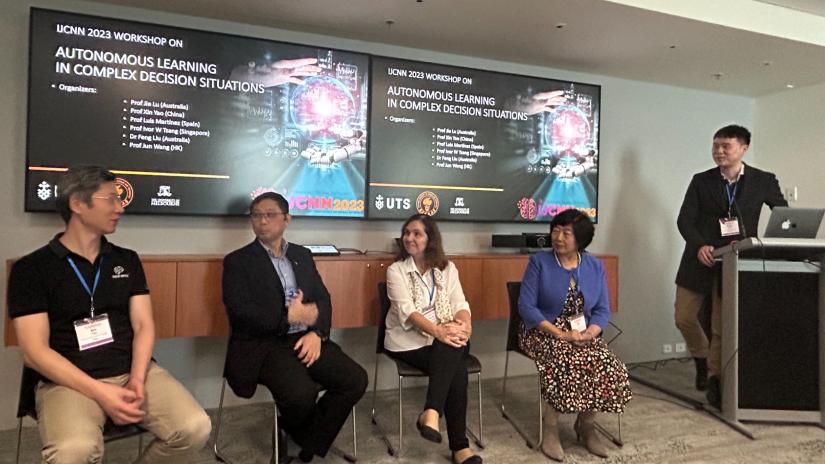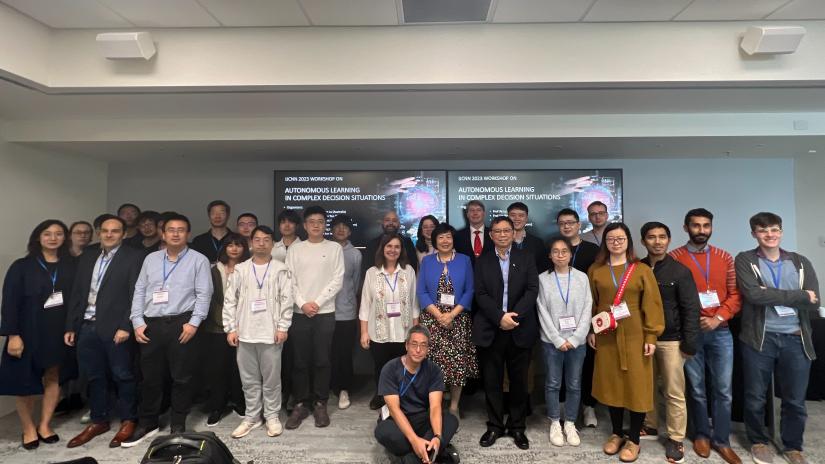A special report on IJCNN: Workshop on Autonomous Learning in Complex Decision Situations, held June 23 2023, in Queensland, Australia.
Autonomous Learning Workshop | IJCNN 2023
The recent IJCNN 2023 saw a number of distinguished scholars in the field of artificial intelligence deliver presentations on the concepts, techniques, and practical implementations of autonomous learning, including many from AAII.
On Friday 23 June 2023, the workshop on Autonomous Learning in Complex Decision Situations was held at the Gold Coast Convention and Exhibition Centre in Queensland, bringing together researchers from across the globe with the goal of further developing autonomous machine learning in complex decision-making and machine learning capabilities.
With several new developments, such as massive stream learning algorithms, incremental and online learning for streaming data, and applications to real-time prediction and decision making, this workshop offered a unified view of the current trends and a forum for discussing further progress in autonomous learning and responsible AI.
Workshop Session 1 chaired by Distinguished Prof. Jie Lu of the University of Technology Sydney (AAII)
In this workshop, leading scholars in the field of autonomous learning came together to create an integrated and holistic computational foundation for a new research direction – autonomous learning in complex decision situations.

Distinguished Prof. Jie Lu, Director of the Australian Artificial Intelligence Institute at UTS, whose ARC Laureate Fellowship project promises to enhance autonomous machine learning for data-driven decision-making across multiple industries.
High-Order Reasoning with Large Language Model in Life-Critical Decisions – Prof. Xue Li (University of Queensland)
Proposing the application of meta-learning techniques to autonomous machine learning, for the purpose of automated feature engineering, self-regulated learning in real-time, and automated assessment of the model performance, all with minimum human interference.
From Neuroscience to Human-Centred Autonomous Intelligent Systems – Dr Javier Andreu-Perez (University of Essex)
Focusing on autonomous intelligence in biology, the key level of biological autonomy learning not only including dynamic incremental and decremental adaptation, but also the generation dynamic “attractors”.
Direction of the Difference between Bayesian Model Averaging and the Best-fit Model on Scarce-Data Low-Correlation Churn Prediction – Dr Paul Darwen (James Cook University)
Autonomous learning in decision-making from the perspective of e-commerce customer churn analysis, demonstrating practical industry application.
Workshop Session 2 chaired by Prof. Xin Yao of Southern University of Science and Technology (SUSTech)

Prof. Xin Yao, Chair Professor and Founding Head of Computer Science at Southern University of Science and Technology (SUSTech), whose research interests include evolutionary computation and neural network ensembles.
Neural Architecture Search Based on Quantum-Inspired Evolutionary Algorithm – Prof. Marley Vellasco (Pontifical Catholic University of Rio de Janeiro)
Research on neuro-evolutionary models. Specifically, introducing concept drift learning under non-stationary environments and quantum-inspired evolutionary algorithms.
Autonomous Out-of-distribution Detection: Theory and Algorithm – Dr Zhen Fang (University of Technology Sydney)
The aim of generalised OOD Detection is to give AI the wisdom to distinguish between the knowledge it has learnt and the knowledge it has not learnt. The realisability assumption is the necessary and sufficient condition to guarantee the generalisation, according to Dr Fang.
Panel – Challenges and Opportunities of Autonomous Learning chaired by Dr Feng Liu of the University of Melbourne
With more than 40 scholars from from the research background of intelligent decision making and intelligent learning algorithm and theory participating, the panel generated diversified views and emerging perspectives for the future of responsible AI.
Panellists:

Panel Discussion: Prof. Xin Yao, Prof. Xue Li, Prof. Marley Vellasco, Dist. Prof. Jie Lu and Dr Feng Liu (left to right)
During the panel discussion, three key topics were thoroughly examined:
- Striking a balance between system and algorithm development in the context of responsible AI.
- Assessing the impact of developing giant models on the progress of machine learning and whether it diverts attention from fundamental research in autonomous learning.
- Exploring strategies for achieving optimal applications of autonomous learning, particularly in the realm of responsible AI.
Responsible AI was a key topic, with panelists sharing their insights and recommendations, highlighting key areas of development specific to the field of autonomous learning. The key takeaways from the discussion are as follows:
- Emphasising the crucial importance of incorporating existing tools rather than solely focusing on advancing individual components when developing an autonomous system with multiple components.
- While the development of giant models can contribute to the progress of machine learning, it is important to balance it with attention to fundamental research, particularly in the autonomous learning domain, in accordance with responsible AI requirements.
- Enhancing learning performance in complex decision scenarios and integrating responsible AI principles are both essential objectives to pursue. The panels collectively stressed the significance of these aspects to ensure the responsible development of autonomous learning within the framework of AI.

The entire audience participating in the workshop, representing the active UTS-SUSTech research collaboration.
UTS-SUSTech Research Collaboration
The Workshop on Autonomous Learning in Complex Decision Situations marked an important activity of the joint research center between University of Technology Sydney and Southern University of Science and Technology (UTS-SUSTech). Sharing in-depth discussions on responsible AI and autonomous learning is of great significance for future cooperative research.
Throughout the two workshops and the panel, students and audience members were lively participants in academic exchanges, discussing active learning methods and application scenarios. The interactive atmosphere led to dynamic exchange on concept drift learning, learning algorithms and theories, and responsible AI scenarios. At the end, panel members gave their final advice to inspire junior students and the audience, that is, “Focus on a clear goal, work hard, and be responsible!”
Interested in responsible AI? Learn more about AAII's Cross-Lab Responsible AI Research Group

